We have been slowed down a bit because Michael has had a rather savage cold, but we’re settling in happily.
On Friday, we had the first of seven private lessons before we start group lessons in early April. We can already see that both kinds of lessons will involve lots of talking and listening – the latter our weakest point. Our teachers are very pleasant and understanding, correcting us as we go and slowing down (a little) when we ask. Fiona discovered how one vowel can make a big difference in how one is perceived. Apparently housewife (shufu) is so close to prostitute (shoufu) …………
Michael’s brother David and sister-in-law Alison arrived from London on Friday evening. They successfully navigated picking up their Japan Rail pass (unlimited use of the JR system, which can only be purchased outside Japan) and coordinating with our reservations to Nikko and Kyoto – next week’s adventures.
We all went out for dinner to a wonderful kaiseki restaurant called Maru in Omotesando (10 minutes walk south of where we live). Kaiseki (会席 – the first Kanji means meeting and the second means a seat) is the Japanese style of cuisine where you eat lots of small courses, seasonal fish and vegetables chosen by the chef for their color, texture, and variety – all presented beautifully. We had a small private room, and sat on cushions on the floor with our feet in a recess below the table.
Breakfast: okonimiyaki! Fiona’s Hiroshima-style pancakes. And off to the Edo-Tokyo Museum for a few hours. It is built to look like a huge elevated warehouse, and the outdoor elevator takes you up to the top floor. There you cross an arched wooden bridge and feel as though you have gone back to 17th century Edo. The exhibits show all aspects of life in the city, and continue to post-1868 Tokyo, as the city was renamed, and on into the 20th century. Michael was moved by a lit display map showing the burning of Tokyo through successive bombing raids in March through May 1945 using incendiary devices that took a fearsome toll on the city’s mostly wooden buildings. On one night alone, 110,000 people were killed, not too many fewer than the numbers who perished a few months later at Hiroshima and Nagasaki. War truly is hell.
After that a visit to Electric Town, as Akihabara is often called. It’s quite an experience, with store after store, each 6 or more floors, stuffed to the gills with electronics of all sorts. Lock your wallets . . .
David and Fiona grilled tuna on the special fish grill area of the tiny stove, sautéed a bok choy kind of greens and we finished the enormous rice dish from last night’s kaiseki meal. Early morning’s start for Nikko tomorrow.
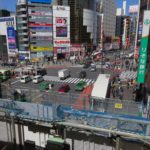
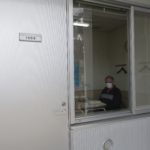
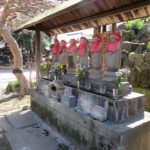
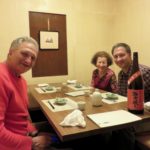
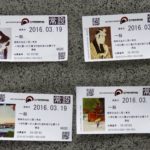
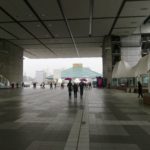
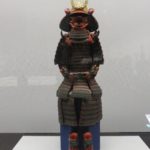
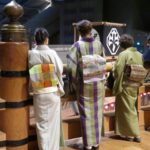
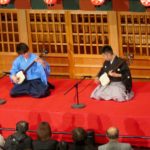
Loving it all .. especially Michael’s face mask at his 1st lesson ! What fun you are having !
All so amazing .. what a time you are having. How is the Japanese going ? I mean are you able to speak and people understand ?
Hi, Sara. I am afraid instant fluency has not been obtained, but every day there is improvement. We’ve not begun school yet, only a few private lessons, so we’re mostly doing self-study.
The constant exposure makes it easier to remember words and our ears are becoming better tuned (although that’s still the biggest struggle). Fiona makes fun of me because she thinks I try to decipher every Kanji I run across including, memorably, on a fire hydrant – but that’s how I learned the Kanji for “emergency”. (非常, pronounced “hee-jaw).
And we are able to have relatively simple conversations. I navigated buying tickets to Kyoto with a Japan Railways employee. Fiona was able to explain about her folded over contact lens to a doctor. One just has to be brave and plow ahead, damning the grammatical and usage torpedoes.